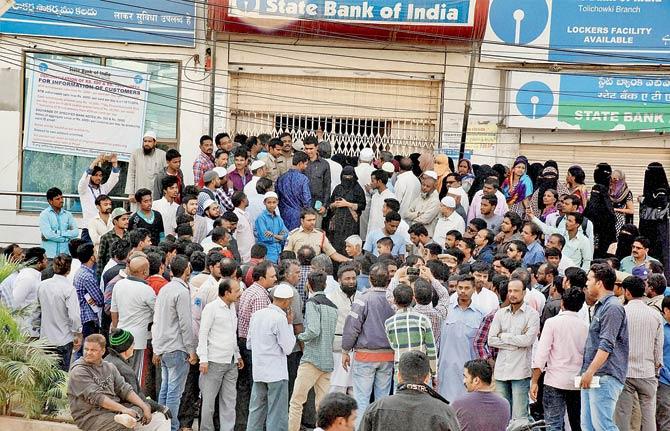NaMo will be remembered for giving birth to the DeMo drive, but only time will tell how his legacy goes down in the history books


Citizens protest the unavailability of cash at a bank in Hyderabad on Friday. Pic/PTI
ADVERTISEMENT
 A friend was extolling Prime Minister Narendra Modi’s virtues, saying that demonetisation was a social experiment that will be studied in future decades and whose template will determine other paradigm-shifting governmental initiatives — if it works. This friend echoes the sentiment of a chunk of Indians (many settled abroad) who not only believe that demonetisation is working — a sentiment not shared by economists or foreign governments — but that Modi is the superstud that India has been waiting for since Lord Krishna. He has turned India into one big shakha where everyone is following a drill and standing on line.
A friend was extolling Prime Minister Narendra Modi’s virtues, saying that demonetisation was a social experiment that will be studied in future decades and whose template will determine other paradigm-shifting governmental initiatives — if it works. This friend echoes the sentiment of a chunk of Indians (many settled abroad) who not only believe that demonetisation is working — a sentiment not shared by economists or foreign governments — but that Modi is the superstud that India has been waiting for since Lord Krishna. He has turned India into one big shakha where everyone is following a drill and standing on line.
The queues haven’t actually thinned; in fact, my bank’s local branch gives out 40-odd tokens every morning for withdrawals, and the limit is Rs 5,000. So there is this sleight of hand. At my house, Ms P is going home for Christmas in a remote part of Jharkhand; though she has an account at the Bank of India, it is a many-miles trudge through the forest to the local branch which in any case has not seen much cash in the past month. She is owed several months’ salary, so these days, when there is no bank holiday, she is queuing up to cash a R5,000 cheque every morning. Thus, the banks are engaged in a sleight of hand of slicing-and-dicing the queues to make things look better.
Yet looks can be deceiving. My wife is in Guwahati for a wedding. The bride is the only daughter of my wife’s uncle, and they are not an ostentatious lot. (The bride and her brother organised the entire thing with help from online research for decor, food, etc.) Yet the one thing that marked this marriage was the paperwork they had to wade through. Of course they got the Rs 2.5 lakh in cash, but it was a bureaucratic procedure that would frighten even Kafka, with the family having to itemise each and every expense. Some Modi fans cheer this; they say the government should know all transactions. Besides the fact that such monitoring of a middle-class marriage is intrusive, almost a personal violation, any sane person should be against turning the government into the Orwellian Big Brother.
Modi asked for 50 days to sort things out, and time is running out. They can’t print the required currency by then, and rumours have been flying — to the extent that a British company had on Friday to deny it was printing the new
currency for India. Modi has assured the Supreme Court that he’ll get the cash in time, but the judges sounded sceptical. His government has told the court there has been no violence or death due to demonetisation, and it is technically correct, as no FIRs have been filed (despite a lathi-charge and firing in the air on the outskirts of Gurgaon last week — apparently the concerned bank’s staff did not dare enter the branch because it had no cash, and the non-opening drove the crowd to a frenzy), and 90-odd deaths have been due to heart illness or dehydration.
Whatever Modi may have told the court, the real promise he must keep is the 50-day one he made to voters. Come New Year’s Day and people will still find UP’s ATMs empty or emptying. UP has twice the ATMs that Delhi does, but 20 times the population. Many people who trusted the PM and stayed civil in queue will feel betrayed. Then the panic will begin.
And yet Modi’s diehard fans think that he has cut some kind of Gordian knot with demonetisation. They have blindly put their faith in its long-term effects which even the most experienced or mathematically-proficient economists have been loathe to do. It has something to do with the Modi persona.
Modi scares the living daylights out of every Indian male. Every Indian male is also secretly jealous of Modi, and not because the superstud left his wife and visits his mother. The aforementioned friend ascribes bizarre yogic powers to Modi, which include the imaginative use of a bucket of milk. Whatever its truth, it is symptomatic of the legends that Modi cheerily allows to accumulate. The Indian male admires Modi’s impulsiveness (even as the Court wondered if demonetisation was done without forethought): our lives are so dictated by expectations that impulse seems a luxury. This, along with the Indian tradition of self-sacrifice for purification (mentioned last week), is perhaps another reason the queues have not turned into riots. Let’s hope it stays that way come January.
A friend in government once told me that Modi wants to be the greatest Indian ever, greater than even Gandhiji. This impulse is pushing us into a recession, likely by summer/monsoon. In which case, superstud Modi would turn out to be India’s revenge on herself.
Senior journalist Aditya Sinha is a contributor to the recently published anthology House Spirit: Drinking in India. He tweets @autumnshade. Send your feedback to mailbag@mid-day.com
 Subscribe today by clicking the link and stay updated with the latest news!" Click here!
Subscribe today by clicking the link and stay updated with the latest news!" Click here!






